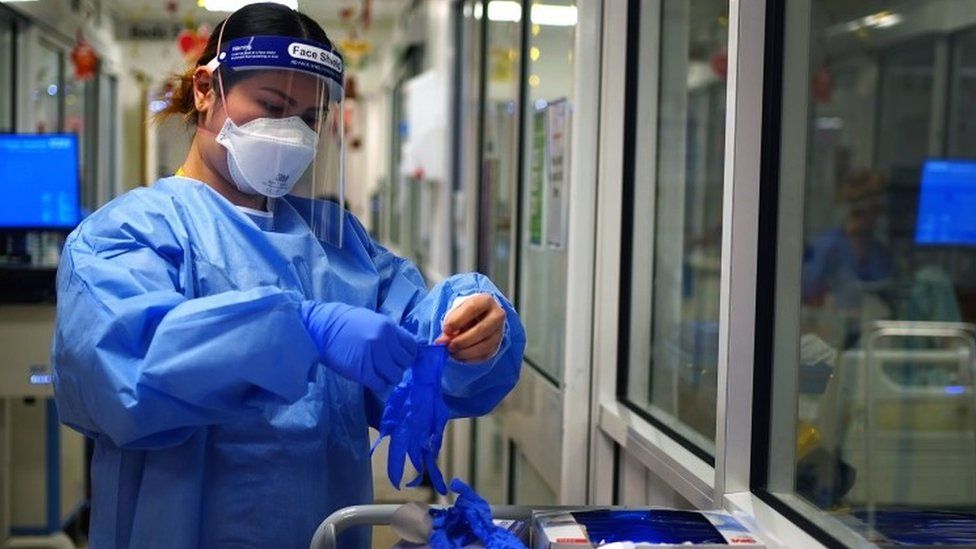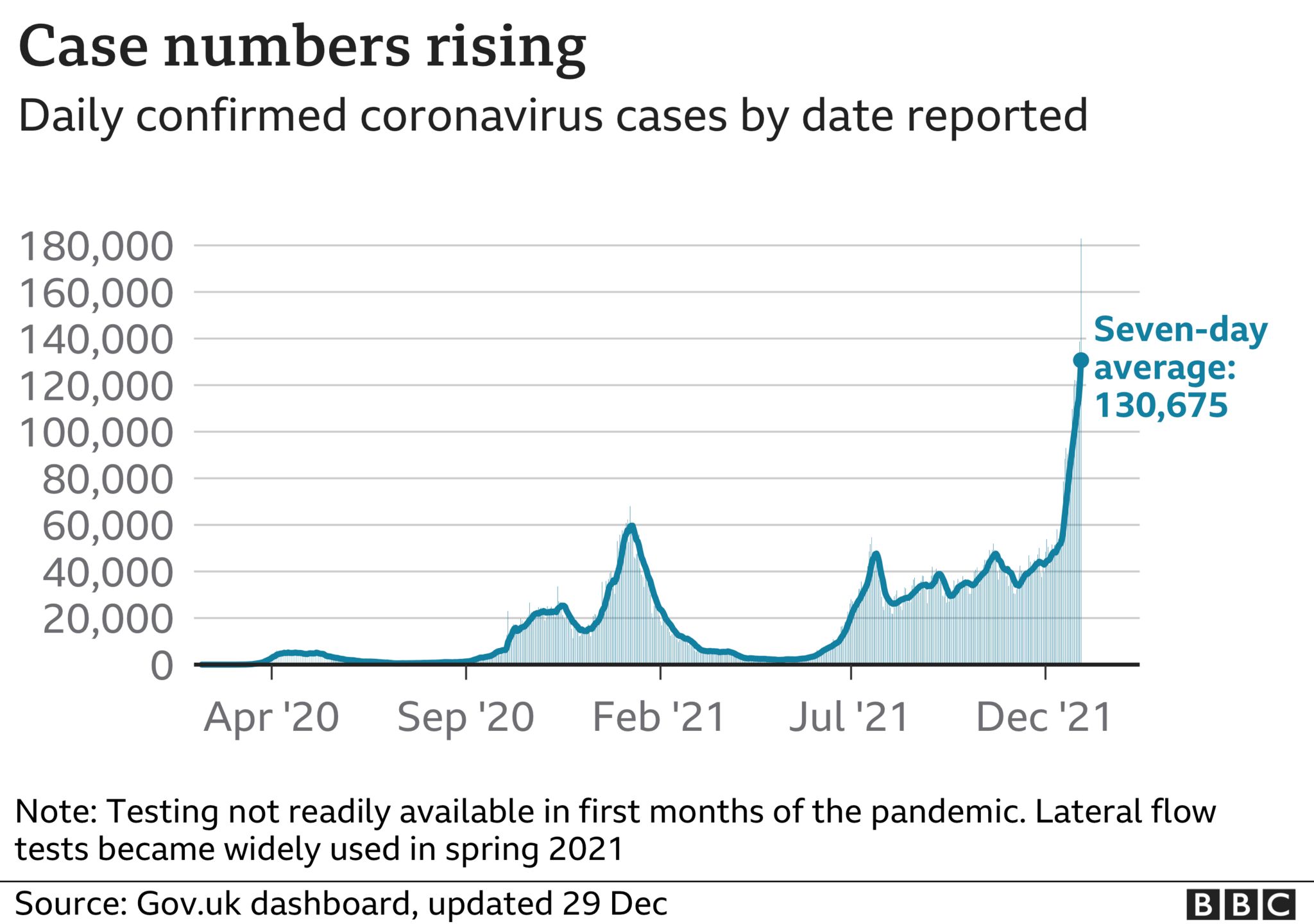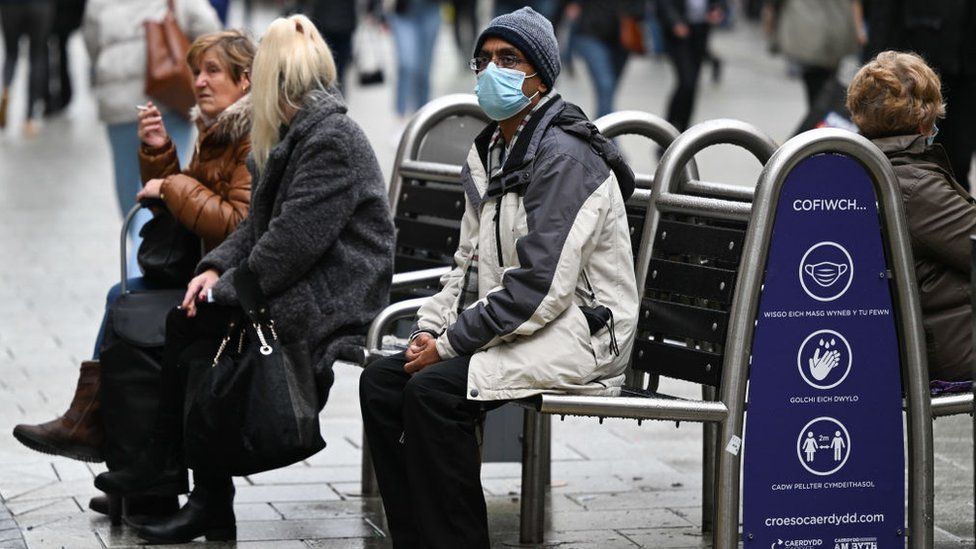It comes as the UK saw record daily case numbers of 183,000 on Wednesday.

Image source, PA Media
Coronavirus “surge hubs” will be set up at hospitals across England in preparation for a potential wave of Omicron admissions, the NHS has said.
The eight temporary sites will each have capacity for around 100 patients, with building work starting this week.
Unlike earlier “Nightingale” hospital units, they will be added to existing hospitals with plans to identify sites for a further 4,000 beds if needed.
NHS medical director Prof Stephen Powis said the service was on “war footing”.
The NHS is often required to deploy extra beds in the winter months but the UK has seen a record number of new Covid cases this week, with 183,000 daily cases reported on Wednesday.
Professor Powis said: “We do not yet know exactly how many of those who catch the virus will need hospital treatment, but given the number of infections we cannot wait to find out before we act and so work is beginning from today to ensure these facilities are in place.”
The hubs will be located at the Royal Preston hospital in Lancashire, St James’ University Hospital in Leeds, Lister Hospital in Stevenage, St George’s Hospital in London, The William Harvey Hospital in Kent, North Bristol Hospital, Solihull Hospital, University Hospitals Birmingham, and University Hospitals Leicester.
A series of hospitals sites named after the 19th Century nurse Florence Nightingale were set up in England during the first wave of the pandemic.

Health Secretary Sajid Javid said he hoped the new hubs “will not have to be used” but that it was right to prepare for all scenarios.
The hubs were described as a “back up insurance policy” by Chris Hopson, chief executive of NHS Providers – the membership organisation for NHS trusts in England.
An email seen by the BBC from Leeds Teaching Hospitals NHS Trust to its staff said that the hubs could be “activated in extremis”.
Trusts have been tasked with identifying other places, such as gyms and education centres, which could be converted to accommodate up to 4,000 patients if required.


This is not a revival of the Nightingale hospitals set up at the height of the pandemic in the spring of 2020.
Then large venues such as conference centres were pressed into service for an anticipated surge in seriously ill Covid patients.
But they were little used as major hospitals preferred to hold on to staff to deal with Covid pressures rather than lend them to the Nightingales.
This time temporary structures will be set up in the grounds of hospitals so staff, equipment and emergency departments are close at hand.
Only those patients who are close to being discharged and need minimal support will be cared for at these facilities.
Creating extra surge capacity is a familiar policy in winter months. But this is on a much bigger scale.
NHS England says its precautionary and the newly created structures may not be needed.
But the fact they are doing it suggests that while Omicron may not make people as seriously ill as Delta the NHS is braced for significant numbers in a potentially major new wave of Covid admissions.

The new facilities are designed to treat patients who need minimal support and monitoring, but are not yet fit for discharge.
They will be manned by a mix of consultants, nurses, and other clinical and non-clinical staff.
Mr Hopson said he “recognises that this will add further stretch to an already hard pressed NHS.”

Image source, Getty Images
As well as the new Nightingale surge hubs, up to 4,800 people a day will receive support via hospice beds or hospice teams.
The NHS will also be increasing its use of virtual wards where patients are monitored via remote technology.
GPs also have access to pulse oximeters – devices that can read blood-oxygen levels, allowing Covid-19 patients to monitor at home.
The network of emergency Nightingale hospitals set up in spring 2020 to cope with the first wave of Covid-19 cases was closed down in April this year.
In England, seven Nightingale hospitals were built, starting with the 4,000-bed facility at London’s ExCel centre. Another was set up in Belfast, while Scotland and Wales had their own temporary hospitals.
Since the closures some sites were used as rehab centres and other sites were kept open for vaccinations.

- LAURA MVULA’S MUSIC ROOM: The star on the music that has got her through 2021
- SIMPLE PLEASURES: Sandi Toksvig explores the Danish notion of hygge
